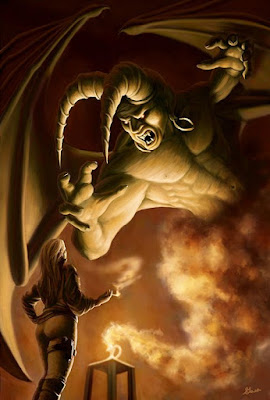I am revisiting the goetic timeline of Poul Anderson's Old Phoenix multiverse. See previous posts dated September 2012.
We note with interest that the literary lineage of magic-as-technology encompasses not only Robert Heinlein and Poul Anderson but also Harry Turtledove. See Poul Anderson, "Introduction" IN Anderson, Operation Chaos (New York, 1995), an unnumbered page facing p. 1.
Poul Anderson's werewolf, Steven Matuchek, says:
"...the strife is older than creation..." (p. 3)
Mike Carey's demon, Lord Arux, says:
"There are alliances and obligations between my vassal lords that go back to the darkness before light."
-Mike Carey, Lucifer: Inferno (New York, 2004), p. 8, panel 5.
Alan Moore's brujeria conjure the Original Darkness that was before the Creation, hoping that it will destroy Heaven. For the outcome, see here.
These are powerful mythological concepts: strife and darkness before creation and alliances that were made in that darkness. The strife as defined by Matuchek is between Law and Chaos. This is even more fundamental than any conflict between a Creator and a rebellious creature.
Matuchek calls to other time streams, not knowing whether they exist. Later, his daughter will travel between them. He cites possible examples of transference between time currents: Benjamin Bathurst and Kaspar Hauser.
Matuchek summarizes the distinctive feature of his Earth quite early in the text:
"...mankind found how to degauss the ruinous effects of cold iron, and the goetic age began..." (p. 15)
He quotes some Latin:
"Ave, Caesar, morituri te salutant..." (p. 10)
Cremation has been made illegal so that doctors can pluck St John' Wort "...from a graveyard by the light of the moon." (p. 6)
Soldiers use basilisks to petrify the enemy but transforming human carbon into silicon generates a radioactive isotope. There is no end to Anderson's logical deductions from fantastic premises. For Classical petrification in CS Lewis' fiction, see here.

5 comments:
Kaor, Paul!
But I do believe the strife between Law and Chaos ultimately goes back to the Adversary's revolt against the Creator. If God exists I argue that means angels are also possible. Which means there might also be good and bad angels.
And I remember reading about Benjamin Bathurst in H. Beam Piper's story "He Walked Around The Horses."
I agree with what you said about Anderson's skill in drawing out logical deductions from fantastic premises. In THREE HEARTS AND THREE LIONS, Holger Carlsen tricks a giant into becoming petrified by the rising sun--and then leaves with his friends in a hurry because the giant's transformation into silicon generated radioactivity.
Sean
Sean:
One problem with Piper's portrayal of Benjamin Bathurst (I wasn't aware of the difficulty until I read some nonfiction on the disappearance): Piper describes Bathurst as "a rather stout gentleman, of past middle age." Historically, he was 25 years old at the time, and a portrait (which appears in the Wikipedia article) doesn't look particularly stout.
It's nonetheless an excellent story, especially when the Prussian officials freak out over a "madman" with documentary proof supporting his "delusions." And of course Sir Arthur's bewilderment over who this "General Wellington" might be.
Hi, David!
It was a very long time ago since I read Piper's "He Walked Around The Horses." So I needed to google the story to find out the real Benjamin Bathurst was a YOUNG, not aging man when he disappeared.
I wonder if I still have this Piper story somewhere amid my SF books? I'll make a stab at looking for it!
And I think I also remember how the Bathurst who appeared in that alternate universe had newspapers talking about the Emperor Napoleon. Which bothered the French government, because GENERAL Bonaparte was a loyal servant of King Louis XVI !
Sean
Sean:
Not newspapers, but official dispatches and the like. He also had diplomatic accreditation, as well as a safe-conduct from the Prussian Chancellery -- but these documents were signed by, from the point of view of the alternate universe, the wrong people. And yet the seals on them seemed entirely correct, and the signature, in one case, was acknowledged without hesitation as his own by the official ... until he saw that "he" had signed this document as Chancellor rather than Minister of Agriculture.
If you can't find it in hardcopy, the story is available on Project Gutenberg, as are several other of Piper's works.
Hi, David!
Again, very interesting! I can see how an apparent "madman" possessing what seemed to be genuine, properly sealed and signed official documents would cause concern. Esp. when they didn't make sense in the context of that alternate universe!
I have heard of Project Gutenberg. But before I use it, I'll first try to find this Piper story in my heaps of SF books.
Sean
Post a Comment